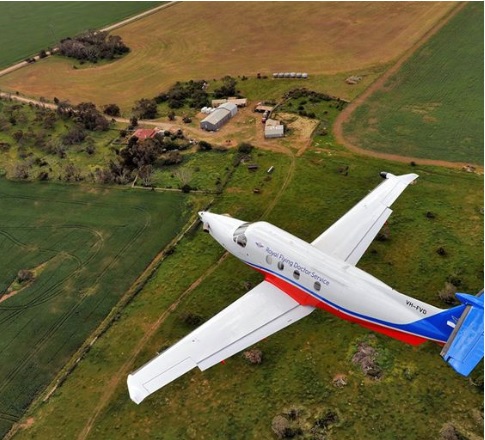
The Royal Flying Doctor Service has commenced flights to bring medical specialists to the Murrumbidgee Local Health District to assist the region during the COVID-19 pandemic. Photo: Supplied.
If people in the bush can be thankful for one thing in an emergency, it’s the Royal Flying Doctor Service (RFDS).
And right now, amid the COVID-19 pandemic, the service is proving it still has our backs.
Built on Australia’s pioneering past – thanks to the vision of missionary Reverend John Flynn – the service offering medical services to remote parts of Australia was first established in Cloncurry, Queensland, in 1928 as the Australian Inland Mission Aerial Medical Service.
It was a one-year experiment that has morphed into the RFDS, now in its 92nd year of operation.
With a fleet of 77 aircraft and 140 road vehicles, its primary healthcare and 24/7 emergency services footprint of 23 air bases covers 7.69 million square kilometres, with a strong focus on rural and remote areas.
In the face of the COVID-19 pandemic, from April 7 the not-for-profit organisation began its assistance in the treatment of patients in the Murrumbidgee Local Health District (MLHD).
David Charlton, RFDS south-eastern section general manager, aviation and strategic development, said it was appropriate for the service to wind back some regular services given the new risks associated with COVID-19.
“We’ve been able to repurpose some of the flying effort towards moving clinicians,” he explained. “We identified there may be an opportunity to help local health districts with this.”
In the wake of commercial airlines shutting down or suspending services to regional destinations due to COVID-19, the MLHD was eager to partner with the RFDS to ensure visiting specialists are still able to travel from Sydney to Wagga Wagga and Griffith.
The first flight landed at Wagga Wagga airport on Tuesday 7 April, delivering four clinicians with a further two mental health clinicians arriving the following day.
“The cancellation of domestic flights to regional centres is one of our biggest challenges,” said Phil Major, manager, MLHD patient flow transport unit.
“We needed to figure out how to secure consistent access to specialists for our region.
“Partnering with RFDS is a great solution to ensure we are still able to provide fly-in and fly-out services in our region. It means we can continue to access the specialist staff we need here on the ground.”
At this stage, weekly flights have been scheduled on Tuesdays, Wednesdays and Thursdays.
Mr Charlton said his aeromedical team is happy to lend a hand.
“I’ve received so many messages of support from our staff. They are so excited to support this initiative.”
He said the RFDS also has capacity for the flights to move some medical supply cargo, blood products, vaccines and pathology if needed.
“Our plan, until they tell us not to, is to fly three days a week touching both Wagga and Griffith, moving clinicians in and out of Sydney.”
Mr Charlton said the RFDS was about to commence a similar service for the NSW Central West – transporting clinicians to Orange and Dubbo.
He added that the current pandemic has resulted in increased demand for the RFDS service, particularly in western NSW, with aeromedical emergency teams desperately needing emergency supplies.
The RFDS relies on donations to keep its services operating.
For more information about the RFDS or to offer support during the COVID-19 pandemic, visit the RFDS website.






